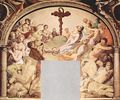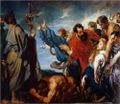Difference between revisions of "Category:Serpent of Bronze (subject)"
| (6 intermediate revisions by the same user not shown) | |||
| Line 10: | Line 10: | ||
According to ancient Jewish tradition (Numbers 21), in the desert of [[Exodus]] the people of Israel murmured against God. As a punishment many died of the poisonous bites of "fiery serpents". Moses erected the bronze image of a serpent, so that the sufferers could look at it as an act of repentance and be healed. | According to ancient Jewish tradition (Numbers 21), in the desert of [[Exodus]] the people of Israel murmured against God. As a punishment many died of the poisonous bites of "fiery serpents". Moses erected the bronze image of a serpent, so that the sufferers could look at it as an act of repentance and be healed. | ||
According to the Books of Kings, the image was put in the Jerusalem Temple and became an object of adoration until it was destroyed by King Hezekiah (2 Kings 18:4). | According to the Books of Kings, the image was put in the Jerusalem Temple and became an object of adoration until it was destroyed by King [[Hezekiah]] (2 Kings 18:4). | ||
The Gospel of John reinterpreted the image as a symbol of the cross, while the Mishnah would remind its readers that it was God not the serpent who brought salvation. | The Gospel of John reinterpreted the image as a symbol of the cross, while the Mishnah would remind its readers that it was God not the serpent who brought salvation. | ||
== | ==Serpent of Bronze, in ancient sources== | ||
====Numbers==== | ====Numbers==== | ||
| Line 35: | Line 35: | ||
<gallery> | <gallery> | ||
File:Brazen Serpent | File:Brazen Serpent Michelangelo.jpg|[[The Brazen Serpent (1511 Michelangelo), art]] | ||
File: | File:Serpent Bronzino.jpg|[[Miracle of the Brazen Serpent (1542 Bronzino), art]] | ||
File:Brazen Serpent | File:Brazen Serpent Danti.jpg|[[Moses and the Brazen Serpent (1559 Danti), art]] | ||
File:Brazen Serpent | File:Brazen Serpent Tintoretto.jpg|[[The Brazen Serpent (1576 Tintoretto), art]] | ||
File:Brazen Serpent | File:Brazen Serpent Dyck.jpg|[[The Brazen Serpent (1620 Dyck), art]] | ||
File:Brazen Serpent | File:Brazen Serpent Rubens.jpg|[[The Brazen Serpent (1639 Rubens), art]] | ||
File:Brazen Serpent | File:Brazen Serpent Bourdon.jpg|[[Moses and the Brazen Serpent (1654 Bourdon), art]] | ||
File:Brazen Serpent West.jpg|[[The Brazen Serpent (1790 West), art]] | File:Brazen Serpent West.jpg|[[The Brazen Serpent (1790 West), art]] | ||
File:Brazen Serpent Bruni.jpg|[[Moses and the Brazen Serpent (1840 Bruni), art]] | |||
File:Brazen Serpent John.jpg|[[Moses and the Brazen Serpent (1898 John), art]] | |||
File:Brazen Serpent Fantoni.jpg|[[Brazen Serpent (2000 Fantoni), art]] | |||
</gallery> | </gallery> | ||
Latest revision as of 10:10, 9 October 2020
The Serpent of Bronze refers to an episode in the narrative of the Exodus of the Israelites from Egypt (Numbers 21:4-9).
Overview
According to ancient Jewish tradition (Numbers 21), in the desert of Exodus the people of Israel murmured against God. As a punishment many died of the poisonous bites of "fiery serpents". Moses erected the bronze image of a serpent, so that the sufferers could look at it as an act of repentance and be healed.
According to the Books of Kings, the image was put in the Jerusalem Temple and became an object of adoration until it was destroyed by King Hezekiah (2 Kings 18:4).
The Gospel of John reinterpreted the image as a symbol of the cross, while the Mishnah would remind its readers that it was God not the serpent who brought salvation.
Serpent of Bronze, in ancient sources
Numbers
Numbers 21:4-9 (NRSV) -- [4] From Mount Hor they set out by the way to the Red Sea, to go around the land of Edom; but the people became impatient on the way. 5 The people spoke against God and against Moses, "Why have you brought us up out of Egypt to die in the wilderness? For there is no food and no water, and we detest this miserable food." 6 Then the LORD sent poisonous serpents among the people, and they bit the people, so that many Israelites died. 7 The people came to Moses and said, "We have sinned by speaking against the LORD and against you; pray to the LORD to take away the serpents from us." So Moses prayed for the people. 8 And the LORD said to Moses, "Make a poisonous serpent, and set it on a pole; and everyone who is bitten shall look at it and live." 9 So Moses made a serpent of bronze, and put it upon a pole; and whenever a serpent bit someone, that person would look at the serpent of bronze and live.
Book of Kings
2 Kings 18:4 -- 4 Hezekiah removed the high places, broke down the pillars, and cut down the sacred pole. He broke in pieces the bronze serpent that Moses had made, for until those days the people of Israel had made offerings to it; it was called Nehushtan.
Gospel of John
John 3:14-15 -- As Moses lifted up the serpent in the wilderness, even so must the Son of Man be lifted up, that whoever believes in Him should not perish but have eternal life
Mishnah
Mishnah R.H. 29a -- The people should look up to the God of heaven, for it is not the serpent that either brings to life or puts to death, but it is God
Serpent of Bronze, in literature & the arts
External links
Pages in category "Serpent of Bronze (subject)"
The following 17 pages are in this category, out of 17 total.
1
- The Brazen Serpent (1511 Michelangelo), art
- Miracle of the Brazen Serpent (1542 Bronzino), art
- Moses and the Brazen Serpent (1559 Danti), art
- The Brazen Serpent (1576 Tintoretto), art
- The Brazen Serpent (1620 Dyck), art
- The Brazen Serpent (1639 Rubens), art
- Moses and the Brazen Serpent (1654 Bourdon), art
- The Brazen Serpent (1790 West), art
- Moses and the Brazen Serpent (1840 Bruni), art
- In the Wilderness; or, The Soul's Life (1895 Naylor / Metcalfe), oratorio
- Moses and the Brazen Serpent (1898 John), art
- Kobberslangen (1958 Hoffmann), novel
- The Brazen Serpent (1994 Ní Chuilleanáin), poetry










